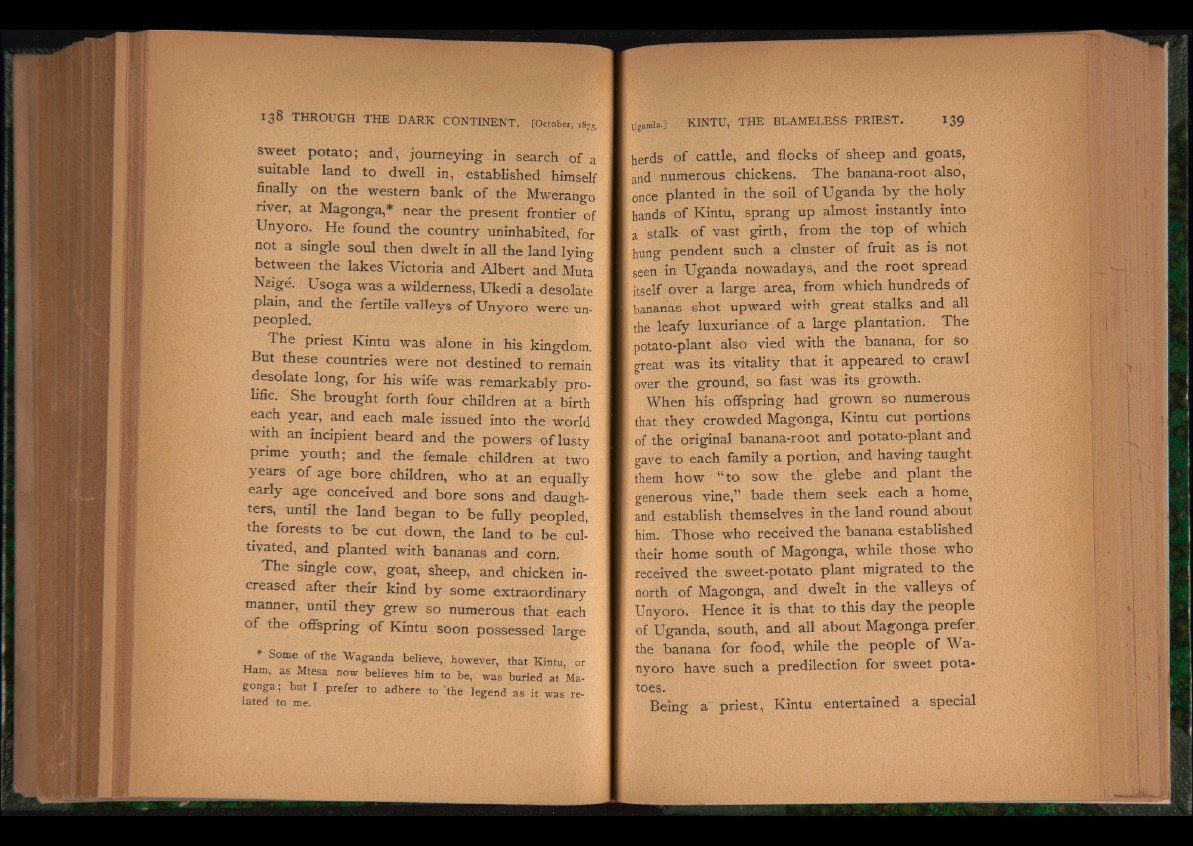
sweet potato; and, journeying in search o f a
suitable land to dwell in, established himself
finally on the western bank o f the Mwerango
river, at Magonga,* near the present frontier of
Unyoro. He found the country uninhabited, for
not a single soul then dwelt in all the land lying
between the lakes Victoria and Alb ert and Muta
Nzige. Usoga was a wilderness, Ukedi a desolate
plain, and the fertile valleys o f Unyoro were unpeopled.
T he priest Kintu was alone in his kingdom.
But these countries were not destined to remain
desolate long, for his wife was remarkably prolific.
She brought forth four children at a birth
each year, and each male issued into the world
with an incipient beard and the powers o f lusty
prime youth; and the female children at two
years o f age bore children, who at an equally
early age conceived and bore sons and daughters,
until the land began to be fully peopled,
the forests to be cut down, the land to be cultivated,
and planted with bananas and corn.
T he single cow, goat, sheep, and chicken increased
after their kind b y some extraordinary
manner, until th ey g rew so numerous that each
o f the offspring o f Kintu soon possessed large
* Some of the Waganda believe, however, that Kintu, or
Ham, as Mtesa now believes him to be, was buried at Magonga;
but I prefer to adhere to *the legend as it was related
to me.
herds o f cattle, and flocks of sheep and goats,
l and numerous chickens. The banana-root also,
i once planted in the soil o f Uganda b y the h oly
I hands o f Kintu, sprang up almost instantly into
a stalk o f vast girth, from the top o f which
! hung pendent such a cluster o f fruit as is not
I seen in Uganda nowadays, and the root spread
[ itself over a large area, from which hundreds of
| bananas shot upward with great stalks and all
the leafy luxuriance o f a large plantation. The
potato-plant also vied with the banana, for So
great was its vitality that it appeared to crawl
over the ground, so fast was its growth.
When his offspring had grown so numerous
that they crowded Magonga, Kintu cut portions
of the original banana-root and potato-plant and
gave to each family a portion, and having taught
them how “ to sow the glebe and plant the
generous vine,” bade them seek each a home^
and establish themselves in the land round about
him. Those who received the banana established
their home south o f Magonga, while those who
received the sweet-potato plant migrated to the
north o f Magonga, and dwelt in the valleys o f
Unyoro. Hence it is that to this day the people
of Uganda, south, and all about Magonga prefer,
the banana for food, while the people o f Wa-
nyoro have such a predilection for sweet potatoes.
Being a priest, Kintu entertained a special